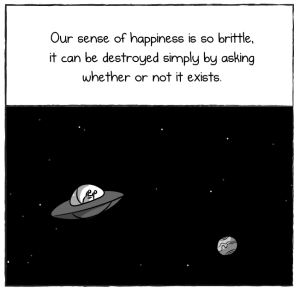It’s OK not to be happy.
This may seem like a stereotypical thing for a therapist to say. We seem to always be telling people that all of their feelings are valid and that it’s OK to cry. There is often an assumption connected with this sentiment, though: It’s OK to not be happy, for a limited amount of time. It’s OK to cry and “get it out of your system”. Whether therapists mean to say this or not, clients often hear it that way. Many people place expectations on themselves that there is some sort of “goal” or “end game”, where they will eventually transcend these painful feelings.
It’s true that therapy can help people feel better. As clients progress in therapy, they learn to sit with challenging emotions without being overwhelmed. Eventually, the emotions pass over and through, and something else takes their place. This is where healing occurs. Depression and anxiety often arise when we resist or hold onto an emotion. This leaves us “stuck” in that emotion, which just makes us feel worse.
Our definitions of “happy” need to be reexamined. Recently, I ran across a humorous but poignant comic, which sheds some light on the issue. I know that The Oatmeal is not a exactly scholarly source of information, but I do believe this comic is worth reading, especially for many people who struggle with mental illness.
The comic paints a vulnerable portrait of someone who experiences ongoing anger and anxiety, and throws themselves utterly into their work. They spend 12 hours per day on their comic, and when they stop, they run for miles until every part of their body aches. This is someone who admits that they do not feel the cheery positivity that most of us think about when we imagine “happy”. What they do feel is curiosity, ecstasy and a passionate drive to create.
When discussing this comic with friends who have chronic mental health conditions, I heard several people say “yes, that’s me! I’m so happy someone is writing about this!” We tend to box happiness into a neurotypical model where we maintain a consistent state of calm and positivity. This simply isn’t they way emotions work. Our restrictive definitions of happiness not only disempower people with anxiety, depression or PTSD, they also give all of us an unrealistic set of expectations, and ultimately set us up to fail.
While I don’t advocate that people adopt author’s work habits or exercise routine, there is beauty in this person’s passion, and their vulnerable choice to create something beautiful in a world where anxiety and anger are a day to day reality. In this world, there is a lot to be anxious and angry about. There are also a lot of reasons to feel awe, reverence and love.
Sometimes, an intense emotion is an appropriate response to an intense experience, especially in our current global situation. This does not mean that we will feel that emotion forever, nor does it mean that something terrible will happen because of that emotion. It may be that we will just have a day or an hour or a minute where we feel…unhappy. Until we don’t. And then the sun rises, the tea kettle whistles and the cats rub their heads against our legs, reminding us that our love matters to them. Then there is joy, and we get to drink that up. It’s OK to cry over small joys, just as it is Ok to cry over great tragedies.
Be curious. Busy yourself with what matters most. Create something. Let contentment arise naturally and wash over you. It can’t be forced, but it can be enjoyed when it comes. It is OK to be happy with our perfectly unhappy states.

